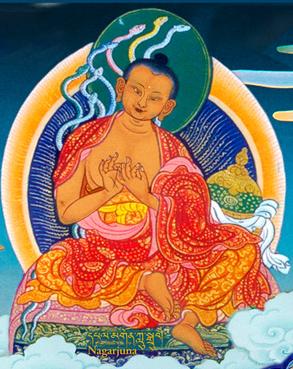
XVII.1.
And friendship: that is the dharma; that is the seed for the fruit now and after death.
XVII.2.
The variety of acts of that action has been explained in many ways.
XVII.3.
But that action which is a result of having willed: that is considered by tradition as physical or verbal.
XVII.4.
Also the other unknown which is considered to be at rest;
XVII.5.
And volition: these seven basic elements (dharma) are considered by the tradition as the modes of action.
XVII.6.
If an action were stopped—being stopped, what will it produce?
XVII.7.
But without a seed that process does not proceed.
XVII.8.
The fruit, presupposing the seed, neither comes to an end nor is eternal.
XVII.9.
But without a thought that process does not proceed.
XVII.10.
The product, presupposing the thought, neither comes to an end nor is eternal.
XVII.11.
And the five qualities of desired objects i.e., desire to know the form, sound, odor, taste, and touch of existence are fruits (phala) of the dharma both now and after death.
XVII.12.
Therefore, that explanation is not possible.
XVII.13.
That which is followed by the Buddha, the self-sufficient enlightened ones (Pratyekabuddha) and the disciples of Buddha.
XVII.14.
The imperishable is of four kinds in its elements (dhatu), desire, form, non-form, and pure; in its essential nature it cannot be analyzed.
XVII.15.
Therefore, the fruit of actions originates by the imperishable force.
XVII.16.
Fallacies like the destruction of action would logically result.
XVII.17.
Of all identical and different actions belonging to the same element (dhatu) originates.
XVII.18.
And it remains constant even in the development of all bifurcating action.
XVII.19.
There the difference is characterized as impure and pure.
XVII.20.
And the imperishable reality of action: such was the teaching taught by the Buddha.
Nargarjuna refutes the above arguments:
XVII.21.
Because it is without self-existence.
Since it does not originate, it does not perish.
XVII.22.
An action would be an un-produced thing; certainly, there is no eternal thing which is produced.
XVII.23.
Then the opposite to a saintly discipline would follow as a fallacy.
XVII.24.
And even the distinction between saints and sinners is not possible.
XVII.25.
If an act, because it persists, exists through its own nature.
XVII.26.
If these desires do not really exist, how would the action really exist?
XVII.27.
If action and desire are empty, what need one say about “body”?
XVII.28.
The man shrouded in ignorance, and chained by craving (trsna)
Is one who seeks enjoyment. He is not different from the one who acts, nor identical to it.
XVII.29.
Since action is not “originated presupposing the conditions” nor fails to arise from presupposing the conditions, There is no one acting.
XVII.30.
And if there is no product, how can there be an enjoyer of the product?
XVII.31.
And this magical form formed again another magical form—
XVII.32.
Is like a magical form being magically formed by another magical form.
XVII.33.
Are like a fairy castle, resembling a mirage, a dream.
Source: Orientalia




